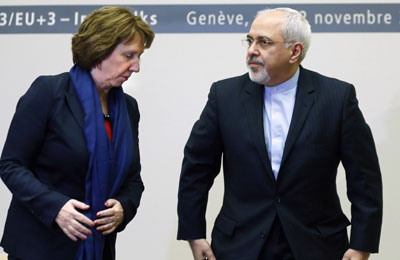
EU foreign policy chief Catherine Ashton (L) with
Iranian Foreign Minister Mohammad Javad Zarif before the talks.
'Very hard' to clinch nuclear deal says US
Geneva, November 21, 2013
Major powers have resumed talks on a preliminary agreement to curb Iran's nuclear programme with the United States warning it would be "very hard" to clinch a breakthrough deal this week and Tehran flagging "red lines".
Each side appeared to tempering anticipation of an imminent agreement after the US, Russia, China, France, Britain and Germany came close to winning concessions from Tehran in the last round of negotiations two weeks ago.
Policymakers from the six governments have since said an interim accord on confidence-building steps could finally be within reach to defuse a decade-old standoff and dispel the spectre of a wider Middle East war over the Islamic Republic's nuclear ambitions.
British Foreign Secretary William Hague said remaining differences were narrow in the search for an interim deal that essentially would require Iran to limit its contested uranium enrichment programme in exchange for limited relief from sanctions.
"It is the best chance for a long time to make progress on one of the gravest problems in foreign policy," Hague told a news conference in Istanbul.
Russian Foreign Minister Sergei Lavrov said: "We hope the efforts that are being made will be crowned with success at the meeting that opens today in Geneva."
A senior US negotiator was more cautious, telling reporters: "I think we can (get a deal). Whether we will, we will have to see because it is hard. It is very hard ... If it was easy to do, it would have been done a long time ago."
The official, with an eye to prominent sceptics of deal-making with Iran, including Israel and hawks in the US Congress, said the vast majority of sanctions - particularly on Iranian oil exports and banking - would remain intact after any initial pact and Washington would "vigorously" enforce them.
On the other hand, a Western diplomat said there was still a "very high probability" that foreign ministers would return to Geneva this week to try to nail down an agreement in the negotiations, expected to run through Friday.
A second Western diplomat expressed guarded optimism about a deal, but said "the ball is in the Iranian court."
Western governments suspect Iran has enriched uranium with the covert aim of developing the means to fuel nuclear weapons, which Tehran denies. Refined uranium is used to run nuclear power stations - Iran's stated goal - but can also constitute the core of a nuclear bomb, if enriched to a high degree.
Iranian Supreme Leader Ayatollah Ali Khamenei said in a speech as Western negotiators gathered in the Swiss city that Tehran would not step back from its nuclear rights and he had set "red lines" for his envoys in Geneva. By rights, he was alluding to nuclear fuel production on Iranian soil.
He added, according to his official website: "We want to have friendly relations with all nations and peoples. The Islamic system isn't even hostile to the nation of America, although with regards to Iran and the Islamic system, the American government is arrogant, malicious and vindictive."
Khamenei also called Israel a "rabid dog", and criticised France, which spoke out against a draft deal floated at the November 7-9 negotiating round, for "succumbing to the United States" and "kneeling before the Israeli regime". France said the comments were unacceptable.
The US official said Khamenei's remarks were "of course, of concern." He said leaders in Iran and the US should not engage in rhetoric that deepens mistrust between the two estranged nations, which have not had diplomatic relations for more than three decades. - Reuters







